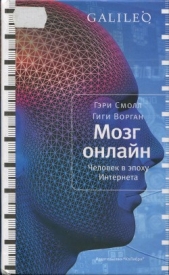Мозг онлайн. Человек в эпоху Интернета

Мозг онлайн. Человек в эпоху Интернета читать книгу онлайн
Сегодня мы уже не можем себе представить жизнь без компьютеров и Интернета. Каждый день возникают все новые и новые гаджеты, которые во многом определяют наше существование — нашу работу, отдых, общение с друзьями. Меняются наши реакции, образ мышления. Известный американский психиатр, профессор Лос-Анджелесского университета и директор Научного центра по проблемам старения Гэри Смолл вместе со своим соавтором (и женой) Гиги Ворган утверждают: мы наблюдаем настоящий эволюционный скачок, и произошел он всего за пару-тройку десятилетий!
В этой непростой ситуации, говорят авторы, перед всем человечеством встает трудная задача: остаться людьми, не превратившись в придаток компьютера, и не разучиться сопереживать, общаться, любить…
Внимание! Книга может содержать контент только для совершеннолетних. Для несовершеннолетних чтение данного контента СТРОГО ЗАПРЕЩЕНО! Если в книге присутствует наличие пропаганды ЛГБТ и другого, запрещенного контента - просьба написать на почту [email protected] для удаления материала
107. Cooper A., Safir M. P., Rosenmann A. Workplace worries: A preliminary look at online sexual activities at the office — emerging issues for clinicians and employers. Cyberpsychology & Behavior 2006: 9:22-29
108. Lorenz V. C., Politzer R. M. Yaffee R. A. Final report of the Task Force on Gambling Addiction in Maryland, www.nyu.edu/its/statistics/D0cs/task_force_4.html
109. Ackman D. Why pick on Internet gambling? Los Angeles Times. October 29, 2006, www.latimes.com/news/opinion/la-op-ackman290ct29,0,656569.story?coll=la-opinion-rightrail
110. Unlawful Internet Gambling Enforcement Act of 2006, www.techlawjournal.com/cong109/bills/house/gambling/20060929.asp
111. George Ladd and Nancy Petry of the University of Connecticut: Ladd GT, Petry NM. Disordered gambling among university-based medical and dental patients: A focus on Internet gambling. Psychology of Addictive Behaviors 2002:16:76-79
112. Dodd M. L, Klos K. J., Bower J. H., et al. Pathological gambling caused by drugs used to treat Parkinson disease. Archives of Neurolog у 2005; 62:1377-1381
113. Ransom I. Chinese boot camps tackle Internet addiction. International Herald Tribune. March 12, 2007, www.iht.c0m/articles/2007/03/12/business/addicts.php.
114. Tup Р. А., O’Kane G., Wingfield A. Distraction by competing speech in young and older adult listeners. Psychology and Aging 2002; 17:453-467
115. American Psychiatric Association. Diagnostic and Statistical Manual for Mental Disorders DSM-IV-TR, Fourth Edition (text revision). Washington, DC, American Psychiatric Association. 2000
116. Polanczyk G., Rohde LA. Epidemiology of attentiondeficit/hyperactivity disorder across the lifespan. Current Opinion in Psychiatry 2007; 20:386-392
117. Chan P. A., Rabinowitz T. A cross-sectional analysis of video games and attention deficit hyperactivity disorders symptoms in adolescents. Annals of General Psychiatry 2006; 5:16
118. Yen J. Y., Ко C. H., Yen C. F., Wu H. Y., Yang M. J. The comorbid psychiatric symptoms of Internet addiction: Attention deficit and hyperactivity disorder (ADHD), depression, social phobia, and hostility. Journal of Adolescent Health 2007; 41:93-98
119. Ha J. H., Yoo H. J., Cho I. H., Chin R, Shin D., Kim J. H Psychiatric comorbidity assessed in Korean children and adolescents who screen positive for Internet addiction. Journal of Clinical Psychiatry 2006; 67:821-826
120. Christakis D. A., Zimmerman F. J., DiGuiseppe D. L, McCarty C. A. Early television exposure and subsequent attentional problems in children. Pediatrics 2004; 113:707-713
121. American Academy of Pediatrics. Children, adolescents, and television. Pediatrics 2001; 107:423-426
122. Vandewater E. A., Rideout V. J., Wartella E. A., Huang X., Lee J. H., Shim M. S. Digital childhood: Electronic media and technology use among infants, toddlers, and preschoolers. Pediatrics 2007; 119(5):e1006-1015, http://pediatrics.aappublications.org/cgi/content/full/119/5/e1006
123. Spencer T. J., Biederman J., Mick E. Attentiondeficit/hyperactivity disorder: diagnosis, lifespan, comorbidities, and neurobiolog y. Journal of Pediatric Psychology 2007; 32:631-642
124. Eppinger B., Kray J., Mecklinger A., John O. Age differences in task switching and response monitoring: evidence from ERPs. Biological Psychiatry 2007; 75:52-67
125. Rubinstein J. S., Meyer D. E., Evans J. E. Executive control of cognitive processes in task switching. Journal of Experimental Psychology and Human Perceptual Performance 2001; 27:763-797
126. Thompson C. Meet the life hackers. The New York Times. October 16, 2005
127. Allen K, Blascovich J. Effects of music on cardiovascular reactivity among surgeons. Journal of the American Medical Association 1994; 272:882-884
128. Carroll L Indigo Children. Hay House, London, 1999
129. McPartland J., Klin A. Asperger’s syndrome. Adolescent Medicine Clinics 2006; 17:771-788
130. Baum S. M., Olenchak F. R., Owen S. V. Gifted students with attention deficits: Fact and/or fiction? Or, can we see the forest for the trees? Gifted Child Quarterly 1998; 42:96-104
131. Healey D., Rucklidge J. J. An exploration into the creative abilities of children with ADHD. Journal of Attention Disorders 2005; 8:88-95
132. Shaw P., Greenstein D., Lerch J., et al. Intellectual ability and cortical development in children and adolescents. Nature 2006; 440:676
133. Whitehouse M. Mind and matter. Is an economist qualified to solve puzzle of autism? The Wall Street Journal. February 27, 2007. Waldman M. Does television cause autism? www.johnson.cornell.edu/faculty/profiles/waldman/autpaper.html
134. Williams D. L, Goldstein G., Minshew N. J. Neuropsychologic functioning in children with autism: Further evidence for disordered complex informationprocessing. Child Neuropsycholog y 2006:12:279-298
Koshino H., Капа R. K., Keller T. A., Cherkassky V. L, Minshew N. J., Just M. A. fMRI investigation of working memory for faces in autism: Visual coding and underconnectivity with frontal areas. Cerebral Cortex 2008; 18:289-300
135. Nacewicz B. M., Dalton K. M., Johnstone Т., et al. Amygdala volume and nonverbal social impairment in adolescent and adult males with autism. Archives of General Psychiatry 2006; 63:1417-1428
136. Dalton K. M., Nacewicz B. M., Alexander A. L, Davidson R.J. Gaze-fixation, brain activation, and amygdala volume in unaffected siblings of individuals with autism. Biological Psychiatry 2007; 61:512-520
137. Mathiak K., Weber R. Toward brain correlates of natural behavior: fMRI during violent video games. Human Brain Mapping 2006; 27:948-956
138. Mason M. Is it disease or delusion? U.S. takes on a dilemma. The New York Times. October 24, 2006
139. Small G. W., Borus J. F. Outbreak of illness in a school chorus: Toxic poisoning or mass hysteria? New England Journal of Medicine 1983; 308:632-635
140. Vuilleumier P. Hysterical conversion and brain function. Progress in Brain Research 2005; 150:309-329
141. Small G.W., Borus J.F. The influence of newspaper reports on outbreaks of mass hysteria. Psychiatric Quarterly 1987; 58:269-278
142. Alao A. O., Soderberg М., Pohl E. L, Alao A. L Cybersuicide: Review of the role of the internet on suicide. Cyberpsychology and Behavior 2006; 9:489-493
143. Rajagopal S. Suicide pacts and the Internet. British Medical Journal 2004; 4:329:1298-1299
144. Angst J. Major depression in 1998: Are we providing optimal therapy? Journal of Clinical Psychiatry 1999:60 Suppl 6:5-9
145. Cacioppo J. T., Hughes M. E., Waite L. J., Hawkley L. C., Thisted R. A. Loneliness as a specific risk factor for depressive symptoms: Cross-sectional and longitudinal analyses. Psychology and Aging 2006; 21:140-151
146. Czaja S. J., Chamess N., Fisk A. D., et al. Factors predicting the use of technology: Findings from the Center for Research and Education on Aging and Technology Enhancement (CREATE). Psycholog у and Aging 2006; 21:333-352
147. Lubman D. I., Yücel М., Pantelis C. Addiction, a condition of compulsive behaviour? Neuroimaging and neuropsychological evidence of inhibitory dysregulation. Addiction 2004; 99:1491-1502


























